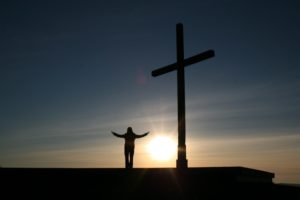I go to the nail shop for a manicure about every 3 weeks. When I go, I get gel polish over the acrylic nails because it lasts a lot longer, whereas regular polish usually chips. Now, when you get gel polish, they use a UV lamp to dry your nails instead of a blower or fan so that the polish sets. Unlike with regular fingernail polish, where you sit with your hands under the blower at the end, with gel you have to put your hand under the lamp each time they apply a coat of polish.
Typically, I only pay attention as I put my hands under the lamp so that I don’t bump my fingernails and scratch my polish. But this particular time, I actually paid attention as my nails “baked”. After the first couple of coats, I noticed that, when I put my hand under the lamp, it illuminated the color I’d chosen. Once my nail tech finished painting the color on my nails, she added a top coat. This time, when I looked under the lamp, I realized that I couldn’t see the color on my nails anymore, it was just bright white. It reminded me of when you wear white sneakers into a room with UV lights and it just looks bright. I saw how that clear coat really does protect the polish.
The Blood of Jesus Covers All
 If you ever wondered how The blood of Jesus works, I’m pretty sure it’s something like this top coat. And that, teammates, is my point of the day.
If you ever wondered how The blood of Jesus works, I’m pretty sure it’s something like this top coat. And that, teammates, is my point of the day.
Once we accept God’s salvation, the blood is applied and hides us until that’s all God can see. But, just an FYI, our being covered does not mean that we won’t experience the heat that comes with everyday trials and circumstances. We will. However, it does mean that we cannot be destroyed by it. We’ve got to continue enduring the heat in order to be perfected, but the heat cannot cause us harm.
So, What’s the Play Call?
I know that it often seems as if we will not survive the heat of certain situations, but Jesus died so that we would be permanently protected and baked into His glory. Here are a few things to help you remember the benefits of His “top coat”:
- You are covered in tough times. Know that as the death angel was made to pass over the children of Israel when the blood was placed over their doorposts, the enemy is constantly made to pass over you. “For the LORD will pass through to smite the Egyptians; and when he seeth the blood upon the lintel, and on the two side posts, the LORD will pass over the door, and will not suffer the destroyer to come in unto your houses to smite you.” Exodus 12:23
- Jesus endured suffering to protect you. “But he was wounded for our transgressions, he was bruised for our iniquities: the chastisement of our peace was upon him; and with his stripes we are healed.” Isaiah 53:5
- You are saved from God’s wrath. Now, we are to keep His commandments, but we are also guaranteed His merciful covering. And we all know, there is nothing like having God’s grace and mercy on your side. “Much more then, being now justified by his blood, we shall be saved from wrath through him.” Romans 5:9
- You are forgiven. Once that top coat has set on my nails, I am free to move about the country Lol! What I mean is, I can wash dishes, do my hair, and everything else without worrying that my nail polish will start to chip away. Likewise, with the blood of Jesus, you are free to live your life without worrying if your past will come creeping up on you. The blood of Jesus provides forgiveness and a covering for your wrongs. “In whom we have redemption through his blood, the forgiveness of sins, according to the riches of his grace;” Ephesians 1:7
Know that it is always better to be covered and God’s protection trumps any other. Accept the covering of the blood of Jesus Christ.





I like the way you break things down in easy to understand – plain jane – ways. I’ve also just read a previous article on : why I keep repeating the same sin and about what’s godly vs. worldly repentance. I just stumbled upon your article and I really needed it! Anyway, after reading that first article I actually felt a glimmer of hope inside me! I was really down and I just thought I would never recover. But you reminded me of God’s patience and fresh mercy every day. And that He always will love me. Sorry to ramble.… Read more »